University Medal finalists make discoveries at Berkeley about themselves and the world
| 14 May 2009
 University
Medalist Emma Shaw Crane: Top graduating senior is
an intellectual superstar.
University
Medalist Emma Shaw Crane: Top graduating senior is
an intellectual superstar.BERKELEY — This year, five students — Jordan Anaya, Sonia Fleury, Lara Palanjian, Zoe Sima Silverman, and William Vega — were finalists for the University Medal, given to Berkeley's top graduating senior. While they were finishing up their final semesters and anticipating commencement, they took time to answer questions about their lives at Cal and plans beyond Berkeley.
Jordan Anaya: Driven and determined, he has experienced success after "initial adversity and a lot of hard work."
Hometown: Fremont
Age: 21
Major: Microbial biology
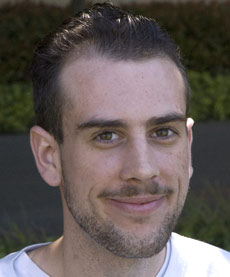 Wendy
Edelstein/UC Berkeley photos
Wendy
Edelstein/UC Berkeley photos'Both of my parents are symbols of strength and hard work for me.'
About Jordan:
Professor of Molecular and Cell Biology John Kuriyan calls
Anaya "one of the most gifted and driven students at Berkeley" whose "learning
rate was so far beyond that of a typical undergraduate that
he was, instead, more like a high-performing new graduate student."
Most important lesson learned?
I always tell myself "live and learn" whenever
I make a mistake. I believe mistakes can be much more important
than successes if you are able to remember your mistakes,
learn from them, and use them as motivation for succeeding.
Turning point?
Junior-high school. I no longer felt comfortable hanging
around with the "cool" kids as I did in elementary
school, and instead spent time with a much nerdier group. As
a result, I put myself on a path where I took honors classes,
and subsequently AP classes in high school. That led me to
where I am today.
Food for thought:
Genius is a word that I hate hearing because to me it implies
someone is inherently talented and doesn't have to put forth
much effort to succeed. In stark contrast to this notion, each
of my accomplishments has followed the common theme of initial
adversity followed by a lot of hard work, more work, and then
and only then, success.
Who has inspired you?
My parents made a lot of sacrifices for me. When I was
very young my mother was diagnosed with cancer, and I saw her
go through her chemo treatment and live for some time with
her cancer in remission, always wondering when and if it would
come back. My dad worked seven days a week for years to support
our family and also coached numerous sports teams that I was
a part of. Both of my parents are symbols of strength and hard
work for me.
Post-graduation plans?
I'll be applying for MD/Ph.D. programs and volunteering
at a lab at Children's Hospital and Research Center Oakland
that works on arthrosclerosis.
Sonia Fleury: At Berkeley, she learned "to challenge, question, and reflect upon" her perception of the world.
Hometown: Born in France, raised in California.
Age: 21
Major: History and history of art (double
major)
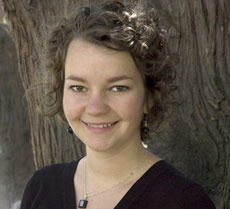 'At
Cal, there's always a professor willing to take a chance on
you..'
'At
Cal, there's always a professor willing to take a chance on
you..'About Sonia: Professor of History Susanna Barrows writes, "Sonia's work, both on the page and in classroom discussions, was insightful, penetrating, and beautifully crafted. Someone like Sonia Fleury comes along only once a generation."
Most important lesson learned?
Que será, será.
Turning point?
In my first year here, I took a course with Professor Susanna
Barrows on the history of 19th and 20th century Paris through
its fiction. I knew from that point on that I wanted to pursue
French history, and that decision has really shaped my experience
at this university. Professor Barrows' passion, liveliness,
and generosity have taught me so much not just about history,
but also about life, and for that I'm eternally grateful.
Food for thought:
For the past four years, this university has taught me
to challenge, question, and reflect upon my perception of the
world around me. Most importantly, Berkeley has afforded me
the luxury to explore my many interests in a place where there
is no shortage of possibility.
Who has inspired you?
Mark Danner. As a freshman I took a course at the graduate
school of journalism with Mark Danner and Peter Tarnoff on
covering international conflict. That course changed my way
of thinking about the world, and taught me that at Cal, there's
always a professor willing to take a chance on you. Prof. Danner
combines a passion for education with an all-too- rare commitment
to writing about difficult issues that affect us more deeply
than we are often willing to admit.
Post-graduation plans?
I plan to spend the summer in New York City, and hope to
find a job that will allow me to explore my interests in history,
art, or journalism while I apply to graduate school in my year
off.
Lara Palanjian: Her parents' "strong work ethic" has inspired her to make the most of life's opportunities.
Hometown: Novato, CA
Age: 21
Major: Economics and political science
(double major)
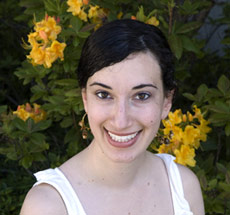 'Research
at Berkeley is "about poking, questioning, tearing, and
analyzing the data until new questions are triggered.'
'Research
at Berkeley is "about poking, questioning, tearing, and
analyzing the data until new questions are triggered.'About Lara:
Terri Bimes, a lecturer in political science who came to
Berkeley from Harvard University, wrote that Palanjian is "an
exceptionally bright and gifted student" and ranks her "in
the top 1 percent of undergraduates" she has encountered
at both universities.
Most important lesson learned?
You have to be proactive and seek out opportunities yourself.
Also, if you follow your passions, you will discover new and
unexpected passions and friendships along the way.
Turning point?
Being a part of an Armenian Christian jazz quartet for
the past two years. I never thought I would be able to combine
my love for culture, jazz, and performance in such a way for
a religious purpose. It has given me a whole new perspective
on how the performing arts can be a tool to advocate for something
you believe in.
Who has inspired you?
Definitely, my parents. As Armenian immigrants, they moved
here from Lebanon in 1975 with a strong work ethic and the
hope of giving me a better life. Their experience has motivated
and inspired me to work hard for any and all of the opportunities
I have received throughout my life.
Food for thought:
I learned that research at Berkeley isn't just about conducting
regression analysis and sitting cozy with the data. It is about
poking, questioning, tearing, and analyzing the data until
new questions are triggered.
Post-graduation plans?
Law school. I am interested in pursuing law and economics
research as well as courtroom advocacy. I also hope to continue
acting and singing post-graduation and always.
Zoe Silverman: The variety of professors she's studied with at Berkeley and abroad have inspired her to become an educator.
Hometown: Sherman Oaks, CA
Age: 22
Major: History
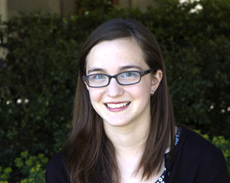
On a year-abroad program from Berkeley, "I learned a lot about myself as a student, as a traveler, and as a person.'
About Zoe:
Professor of History Geoffrey Koziol writes that as a sophomore
Silverman was "already smarter than my very best graduate
students." She is "brilliant. Actually, I think she
is a genius."
Most important lesson learned?
To be humbled by what we don't know, and to be awed by
the expanse of human history.
Turning point?
My year abroad in London. I learned a lot about myself
as a student, as a traveler, and as a person. I feel so lucky
to have had the opportunity to get lost in a foreign country.
Food for thought:
I have been all types of students to all kinds of teachers
for the past four years. Therefore, it seems only natural for
me to pursue teaching as a career after I graduate.
Who has inspired you?
I am fortunate to have a lot of educated women as role
models in my life. My grandmother in particular highly valued
both education and social work. She wore so many hats and helped
so many people — while raising a family at the same time.
Her commitment to serving underprivileged communities is absolutely
inspiring, and I hope to follow in her footsteps.
Post-graduation plans?
I will be teaching high-school social studies in Newark,
NJ with Teach For America.
William Vega: At Berkeley, he "found the courage to say 'I' and stand by his convictions.
Hometown: I was born, and spent most of my time after the age of 7, in North Hollywood, CA. I spent the first seven years of my life in Acton, CA. I hardly ever claim just one place as my hometown. I feel that the different experiences I had — one rural, one metropolitan — are what made me who I am.
Age: 18, but I will be turning 19 over the summer. My last year as a teenager!
Major: French and anthropology (double major)
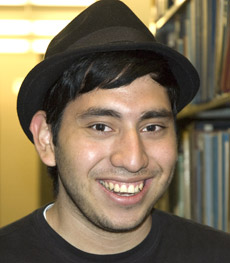 'There's
something to be said for daring to raise your own voice'
'There's
something to be said for daring to raise your own voice'About William:
Nancy Scheper-Hughes, Chancellor's Professor of Anthropology,
called Vega, "intellectually curious" with a "marvelous
blend of wry detachment and empathic engagement that identify
him as an anthropologist in the making" who wants to use
his research "to make the world a safer and saner place."
Most important lesson learned?
It sounds silly, but I finally found the courage to say "I" and
now see the true value of the word. I think it's a wonderful
thing to be part of a collectivity — be it ethnic, educational,
or what have you — but there's also something to be said
for daring to raise your own voice and take a different stance,
especially if it's something you feel strongly about. What I
mean is that I learned it's okay to not agree and that the only
person who loses when I'm passive is me.
Turning point?
The moment I realized I was unhappy in high school and
decided to leave has been the turning point in my life so far.
Although I got a lot of slack for it, that choice led me to
where I am in life today. It also taught me the importance
of standing up for one's own happiness and not conforming.
Who has inspired you?
My parents. They taught me that my dreams are not unattainable,
and that if I want something badly, I should never give up.
They've also been very supportive. In academia, my adviser,
Nancy Scheper-Hughes, has inspired me to stand by my convictions
and do work that I find meaningful and useful to more than
just academia.
Food for thought: It is not my intention to do research with the sole purpose of publishing within academia. I believe there is a greater and better place for research — particularly social-science research — than just academia.
Post-graduation plans?
I'll be staying in Berkeley for the next year and working
in the anthropology department as a research assistant. I also
hope to continue tutoring French students and working on my
own research — hopefully getting some things published — before
I apply to graduate school to study identity politics, immigration,
and marginalization in France among Arab Muslim immigrants.

